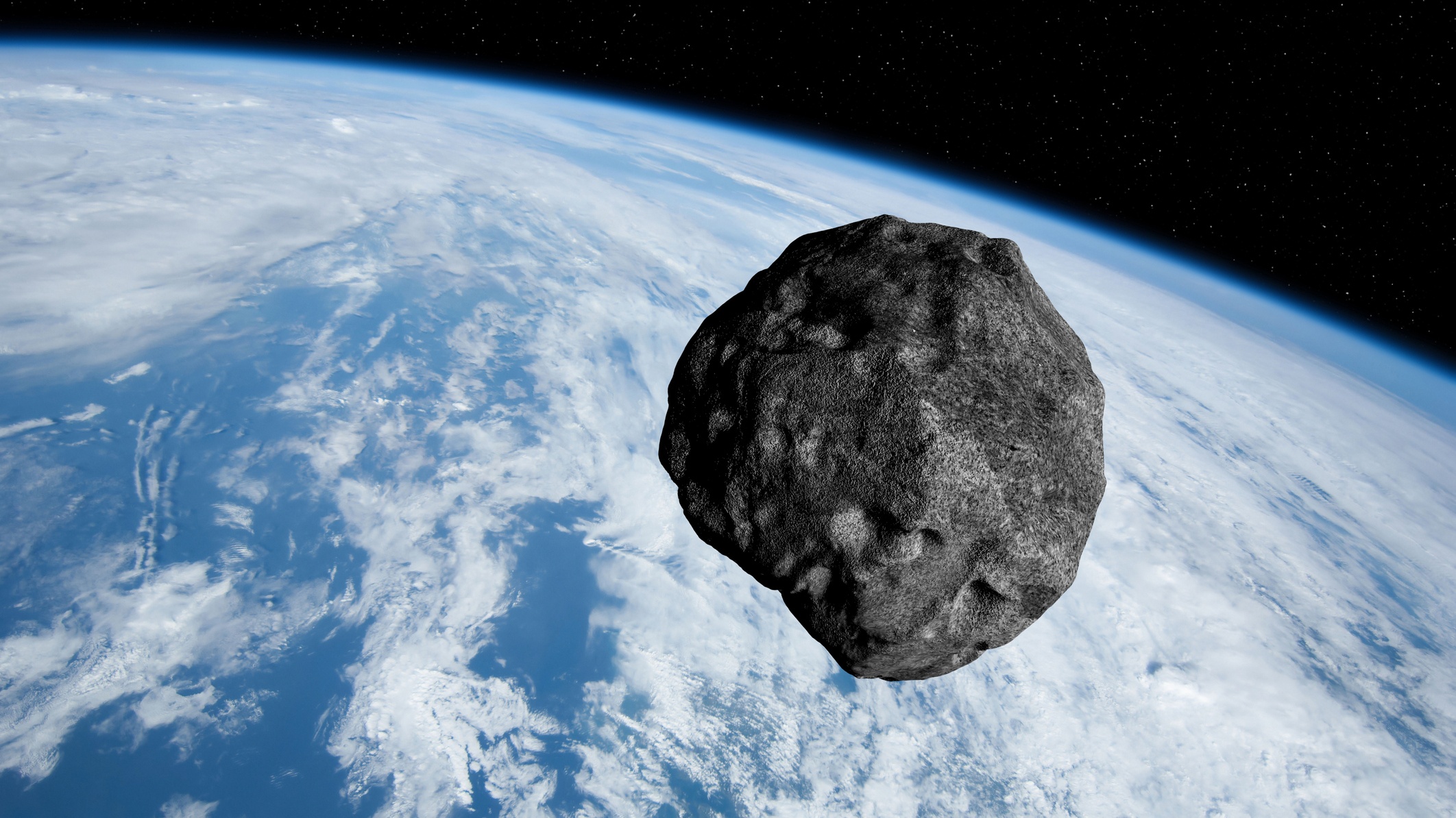
During the summer of 2022, just after the James Webb Space Telescope started sending us a steady stream of deep-space postcards, astronomer Steven Finkelstein and his team found a mysterious red splotch in one of those data deliveries. They'd spotted one of the earliest galaxies humans have ever laid eyes on — a realm that represented a distant pocket of the universe our species once couldn't dream of seeing. And, importantly, they found it on Finkelstein's daughter's birthday, a serendipity that blessed this blob with a name: Maisie's Galaxy.
But not every cosmic object has such a fairytale ending, nomenclature-wise. Someone recently tried to name one of Earth's quasi-moons "Moony McMoonface," and, ironically, the lore behind that is quite a tale.
Not too long ago, Latif Nasser, host of the Radiolab podcast, went sort of viral because he accidentally named a quasi-moon "Zoozve." The short explanation is that he was looking at a poster on his son's wall that claimed Venus has a moon — a curious object named "Zoozve." That raised some alarms because, well, first of all, Venus doesn't have any moons — and second of all, what the hell is Zoozve? Turns out, Nasser was misreading the poster. In truth, it didn't say Zoozve. It said "2002VE," in reference to one of Venus' quasi-moons, space rocks that appear to orbit a planet like a moon, but are actually more like asteroids orbiting the sun. It's just an illusion.
Then, after a mini-saga, Nasser managed to get the International Astronomical Union (the organization in charge of officially naming objects in space) to literally name 2002VE "Zoozve" — and, in honor of that, opened a contest to allow people to try naming one of Earth's quasi-moons, 2004 GU9.
"Just thinking of the word 'Zoozve' (and soon whatever new name the world votes on!) helps me remember how much stuff is out there that we just barely understand, how much stuff we can't really control and yet seems not to be hurting us, how much we humans can together make weird meaning and poetry out of the random bits of rock dust swirling around us," Nasser told Space.com.
And, well, unsurprisingly, someone submitted the name Moony McMoonface — a nod to that time people were invited to name a boat and Boaty McBoatface actually … won. Nasser and his fellow naming-contest panelists, however, were nice enough to allow 2004 GU9 to have a chance at being a cool kid in our solar system.
"Off the top of my head, the top two submissions were probably Quasimoondo and Moony McMoonFace, which, don't get me wrong, I actually love!" Nasser said. "But, given that we are working with the official namers — the IAU — who are following a long tradition of naming things in our solar system after mythology, we had to rule them out."
Concerning mythology, one of the major rules for this competition the IAU set forth is that, whatever name 2004 GU9 gets, it must be rooted in mythology. In fact, it can get pretty tricky naming any cosmic object. Tons of submissions must be vetted by the IAU for both technical and ethical reasons, and it's also generally quite difficult to settle on cosmic names that'll be used for centuries to come. Renaming stuff is another issue in itself. For instance, scientists are trying to get the Magellanic Clouds renamed because they weren't actually discovered by Ferdinand Magellan, and Magellan was actually a murderer and a horrible person overall. This has been met with criticism in some quarters, support in others and, inevitably, paperwork. So, when you pick a space object's name — it better be a good one.

The interesting thing about the mythology aspect, though, is that the mythological meaning could fall under any culture's mythology, per IAU rules. "To me, the most important thing about a name was that it had a good backstory that honored the culture it came from and that felt connected in some way to the quasi-moon itself," Nasser said.
On one hand, that preemptively gets rid of some clever contenders — I was a big fan of the name suggestion "Zooagug," which is what you'd get if you misread 2004GU9 on a poster the way Nasser misread Zoozve — but it certainly didn't prevent the team from getting some awesome submissions nonetheless.
The panelists, which ranged from Bill Nye the Science Guy and "Gossip Girl" actor Penn Badgley to theoretical physicist Sean Carroll and astrophysicist Wanda Diaz Merced, came up with a final seven options.
The first is "Bakunawa," in reference to a moon-eating, serpent-like dragon in Filipino mythology that's said to cause eclipses and earthquakes. The second is Cardea, who, in Roman mythology, is the goddess of the door hinge and protects homes from receiving evil intruders. The third is Ehaema, a nocturnal spirit in Estonian mythology. The fourth is Enkidu, a legendary figure and friend of the iconic Gilgamesh in Mesopotamian (Sumerian) mythology. The fifth is Ótr, who, in Norse mythology, could take any form but usually picked that of an otter. The sixth is Tarriaksuk, in reference to humanoid shadow beings that exist in another dimension, according to Inuit mythology — and the last is Tecciztecatl, a lunar deity representing the "man on the moon" in Aztec mythology.
"There were so many names from so many cultures that I — and all of us on the team — fell in love with that didn't work for one or another reason," he said. "For instance, we ruled many names out because there were already space objects with those names. Or, in other cases, we spoke to someone from that culture who said they didn't think it appropriate to use that name in that way."
"It's funny," he continued. "Sometimes people thought a name was not good or important or lofty enough to be used in space. Sometimes it was the reverse; people thinking that giving this name to a lowly quasi-moon was akin to a demotion for the name. It took me a minute, but I came to understand both of those positions."
This whole saga brings into focus a few things. Most obviously, it really enhances the fact that our actual moon does not have a name at all. Mars' moons Phobos and Deimos have names, all the planets have names, including exoplanets that only go by their automatically generated ones, and even the sun has a name. We don't call the sun, "star," so why is our moon just "moon?"
According to NASA, our moon simply shares a name with all moons "because people didn't know other moons existed until Galileo Galilei discovered four moons orbiting Jupiter in 1610. The closest unique "name" our moon has is "Luna," which is its name in Latin and where "lunar" comes from as a descriptor of moon stuff — and some argue moon with a capital M is enough of a proper name for it — but at the end of the day, our moon is "moon." Because so much time has passed, I wonder if there is no name for the moon that would ever feel "right."
What this means is that a quasi-moon of Earth (our planet has seven, to be clear) is getting more naming attention than our very own beloved moon. For example, the panelists decided it was imperative that they all meet up in one place to deliberate. No phone-tag; no texts left unread.
"We wanted to find a time when all of our panelists could meet virtually and make the case for names that they loved. But our panelists were all very busy, impressive people scattered across so many time zones — from Hawaii and Haiti and Ghana to Poland and Japan and South Africa and on and on."
"It wasn't easy, but we ended up finding one hour that worked for nearly everybody," he said. "One of the high school students even had to leave at exactly the end of the hour because that was the end of their lunch break!"
All that's left? To vote on the best name, which you can do through Jan. 1, 2025.
"At a time when there's so much division and fear and mistrust, we're excited to create something that reminds us of what we share: the sky," Nasser said. "I imagine people from all different cultures debating the names with their loved ones at their dinner tables, the way I know I'm going to with my kids. And together we will all get to name something that will outlive us all!
"Feels literally monumental!"







